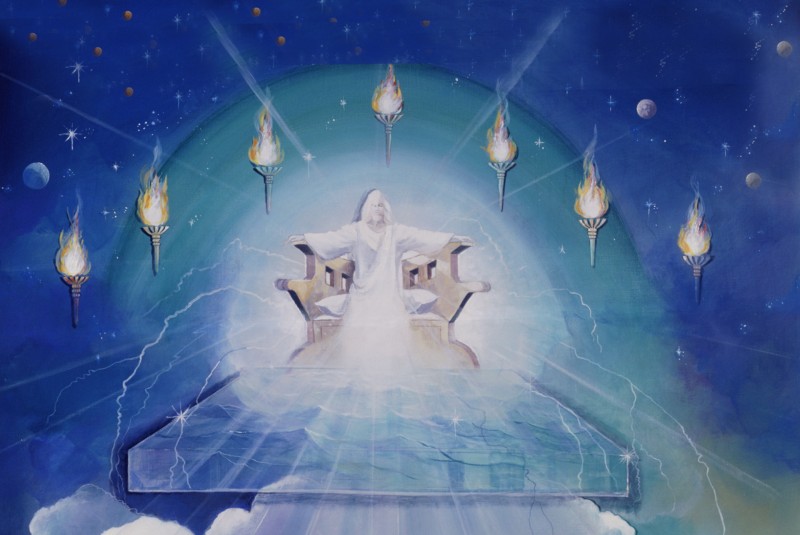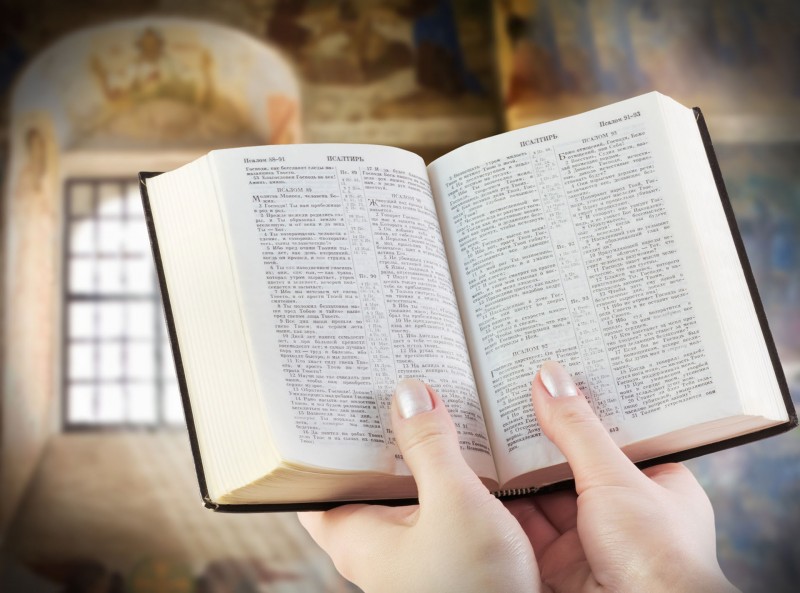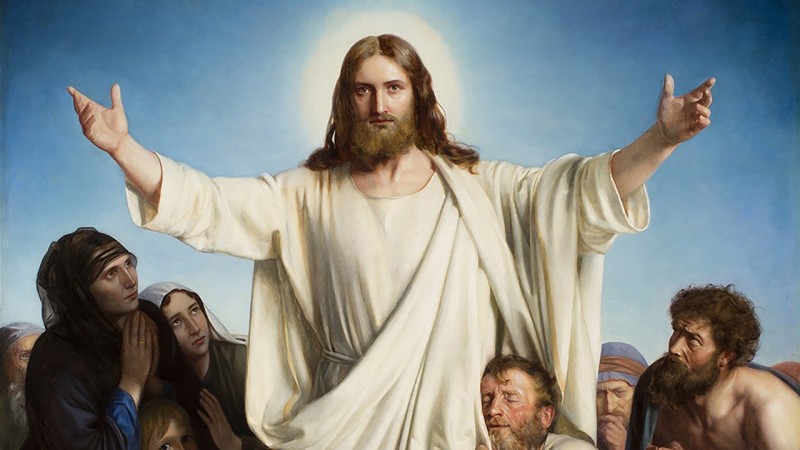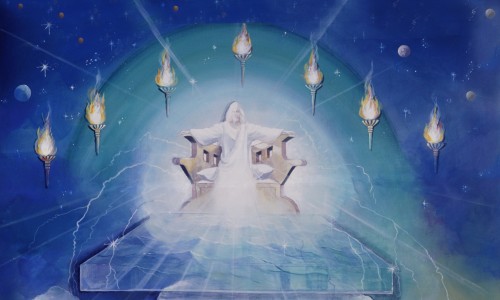“Here I am! I stand at the door and knock” – What does that mean?
Read our Bible study on Jesus’ teachings in His Letter to the Church in Laodicea (The Apocalypse 3:14-22).
“Here I am. I stand at the door and knock . . .”
Let us imagine a house where a family is gathered and protected from outside dangers. They are eating and talking animatedly. There are lots of food on the table and people are happy because it is rare to have everybody together. Suddenly, their loud and animated conversation is interrupted by a light knock on the door.

When Jesus says, “Here I am. I stand at the door and knock,” in the Letter to the Church in Laodicea (The Apocalypse 3:14-22), the scene described above makes us think of our safe place, where we keep our affections, our convictions, and our values.
Letter from Jesus to the Church in Laodicea
This is one of the thought-provoking letters that Jesus addresses to the seven Churches in Asia, in His Apocalypse, the book of Revelation. Because it is revelation, the last book of the Holy Bible holds important information for us about our life, the world we live in, and the destiny we set for ourselves by the good or bad use of our free will.
If the seven Churches in Asia were once literally geographical communities, today their meaning expands to include the entire humanity, in all its different stages of evolution, whether ethical, social, political, philosophical, artistic, or scientific.
After all, the Love of the Ecumenical Christ, the Divine Statesman, embraces all humanity, as Brother Paiva Netto, the President-Preacher of the Religion of God, of the Christ, and of the Holy Spirit, clarifies in his series The Apocalypse of Jesus for the Simple-Hearted.
+ Learn more about the Apocalypse of Jesus through the preaching of the Religion of Universal Love.
Since it is a message about the Love of Jesus, this also explains why the Book of Final Prophecies cannot be seen as a book of terror.
READ MORE:
+ What lesson did Jesus teach us when He warned us not to be lukewarm? - Jesus’ Letter to the Church in Laodicea
+ Apocalypse: the Divine Book delivered to Humanity
Writer Paiva Netto, an expert on the Holy Scriptures and Spirituality for more than six decades, affirms:
“The Apocalypse of Jesus was not made to frighten us with the obscure paths of mystery, but to illuminate the roads of our lives, because Apocalypse means Revelation.”

In this Letter to the Church in Laodicea, after presenting Himself as “the Faithful and True Witness, the Ruler of God’s Creation” (3:14), Jesus invites us to seriously rethink the focus of our own existence.
So we should look around us from a new perspective that we are often unwilling to notice. This is eloquently presented in verse 17:
“You say, ‘I am rich; I have acquired wealth and do not need a thing.’ But you do not realize that you are wretched, pitiful, poor, blind and naked.”
No matter how much we surround ourselves with everything that we earn, through our own efforts, and which is something that promotes a certain quality of life (like houses, cars, and other material goods), there comes a time when our Divine Nature—since we are Spirit—cries out for attention.
Until that happens, or until we have identified the reason for the void we may feel in our lives, the misunderstood search for something else can put us at the mercy of a consumerism that does not actually give us anything at all—despite the value that some in society attribute to it, such as status, power, fame, among other things.
For this reason, Jesus, in the Letter to the Church in Laodicea, protects His disciples from frustration. He removes the false meaning of things in order to offer His beloved followers something greater, as in verse 18:
“I counsel you to buy from me gold refined in the fire, so you can become rich [in spiritual knowledge acquired by experience]; and white clothes to wear, so you can cover your shameful nakedness [with attitudes inspired by Him, covering our character and protecting it spiritually]; and salve to put on your eyes, so you can see [with the brightness of Him who has ‘eyes like blazing fire’ (The Apocalypse 1:14), that is, a lucidity to see things as they really are].”
By way of comfort, the sincerest Friend says:
“Those whom I love I rebuke and discipline. So be earnest and repent” (3:19).

To better understand this point, it is worth mentioning one more reflection by writer Paiva Netto in his article “The Lord of the Future”:
“It is precisely the Prophecies that give us comfort, because to comfort also means to warn, to warn of the danger we are in if we move away from ethical behavior that is blessed by the Creator and intrinsically desired by His creatures, both believers or atheists . . . .”
Then, just at the crucial moment of the introductory lesson to the most serious prophecies of the Apocalypse, such as the seals, the trumpets, and the scourges, Jesus extends to us an encouraging invitation as if to nourish us so we go through the following chapters duly supplied by the great sense of existence that He came to Earth to bring with His New Commandment:
“Love one another, as I have loved you. Only by this shall all of you be recognized as my disciples, if you have the same Love for one another” (The Holy Gospel according to John 13:34 and 35).
READ MORE:
+ What lesson did Jesus teach us when He warned us not to be lukewarm? - Jesus’ Letter to the Church in Laodicea
+ Apocalypse: the Divine Book delivered to Humanity
Christ continues in the Apocalypse 3:20:
“Here I am! I stand at the door and knock. If anyone hears my voice and opens the door, I will come in and eat with that person, and they with me.”
Commenting on these words of Jesus, the president-preacher of the Divine Religion writes in the article “Freedom Implies Temperance”:
“Jesus knocks at the door. Let us open the way for Him so that, with Him, we can enjoy the spiritual food and water that will suffice us for all Eternity. We shall never again suffer a shortage of what makes us strong, as we find in the Gospel according to John 6:35 and 51: ‘I am the Bread of Life. Whoever comes to me will never go hungry, and whoever believes in me will never be thirsty! . . . I am the Living Bread that came down from Heaven. Whoever eats this Bread will live forever .’ . . .”
We see here Christ’s profound respect for our right to choose, because He tells us: “I counsel you,” “I stand at the door and knock”—the decision is ours to make.

We are the ones who can open our minds to Divine matters—by studying and applying the lessons from the Holy Gospel-Apocalypse of the Heavenly Friend—and strengthen our lives and our relationships with the moral and spiritual wealth that Christ offers us when He knocks on our door.
READ MORE:
+ What lesson did Jesus teach us when He warned us not to be lukewarm? - Jesus’ Letter to the Church in Laodicea
+ Apocalypse: the Divine Book delivered to Humanity
If you have any question and/or comment about this and other topics, send them to the Religion of the Third Millennium. Let the Ecumenical Spirituality become a part of your life! And if you felt good reading this article, share it! It might touch the heart of other people too.



